

NUS: Over 10,000 Students Expected at NUS Protest Next Week - By Jessica Fuhl at University of Southampton 01st November 2011 17:29:18.
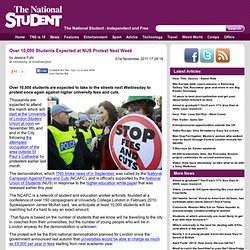
Thousands prepare to march as protest leaders denounce police tactics. Thousands of students are due to march through London on 9 November in a “day of action” coordinated by the National Campaign Against Fees and Cuts.
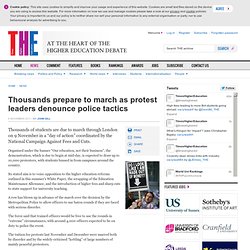
Organised under the banner “Our education, not their business”, the demonstration, which is due to begin at mid-day, is expected to draw up to 10,000 protestors, with students bussed in from campuses around the country. Guardian: Students are fighting not just for education, but the welfare state. On 9 November students will again be taking to the streets.
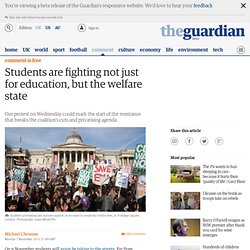
Far from viewing last year's student revolt as a failure, we are determined to block the cuts and privatisation agenda before it becomes a reality, and build a sustainable movement to defeat the government. Monday's announcement that the Metropolitan police may use baton rounds – similar to rubber bullets – on student demonstrators has reinforced the disenfranchisement of those planning to march: not only is our future being dismantled, but we will be violently repressed when we attempt to defend it.
In using a press conference to ramp up the threat of violence, the police are precriminalising protest, making unrest more likely in the process. Tuition fees go-ahead marks the betrayal of a generation. It has been seven months since the coalition government pushed its changes to higher education through parliament by a majority of 21.

The privatisation of university teaching as recommended by the Browne review consists of the creation of a market in fees and an 80% cut to the teaching budget, effectively tripling the cost of university tuition. Students could not have made their opposition more clear. From 10 November 2010 to 29 January 2011, hundreds of thousands of us repeatedly took to the streets and occupied our campuses in what was the most significant youth rebellion that Britain has seen in decades. Many were school students, walking out of their classes to defend their future education.
Student protest provides first major test of new Met chief's 'total policing' Student tuition fees protests were first major public order challenge for new Met chief, Bernard Hogan-Howe The student march against fees and cuts has been the first major public order challenge for the new Metropolitan police commissioner, Bernard Hogan-Howe, and provided a test of his "total policing" policy.
But has anything really changed in the way the Metropolitan police tackle public protest? There has been much talk in recent days of letters being sent to anti-cuts activists warning them of the consequences of attending the demonstration, and the admission by the Met that they had pre-authorised the use of baton rounds to fire plastic bullets. Neither of these tactics is new. Student protest to march on City over university fees. 9 November 2011Last updated at 14:24 ET Students march through central London to protest against rises in tuition fees and changes to higher education.
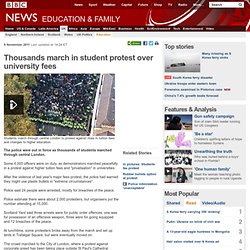
The police were out in force as thousands of students marched through central London. Some 4,000 officers were on duty, as demonstrators marched peacefully in a protest against higher tuition fees and "privatisation" in universities. After the violence of last year's major fees protest, the police had warned they might use plastic bullets in "extreme circumstances". Police said 24 people were arrested, mostly for breaches of the peace. Police estimate there were about 2,000 protesters, but organisers put the number attending at 15,000. Scotland Yard said three arrests were for public order offences, one was for possession of an offensive weapon, three were for going equipped and 12 breaches of the peace. At lunchtime, some protesters broke away from the march and set up tents in Trafalgar Square, but were eventually moved on.
Financial district. Thousands march in student protest over university fees. 9 November 2011Last updated at 14:24 ET.
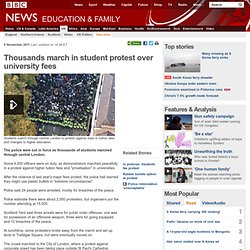
Students to face baton guns if demo turns ugly. Met Police: Baton Rounds Ready for Student Protest. Monday 7th November 2011 Met police have told LBC 97.3 they have baton rounds, which are like rubber bullets, at their disposal should Wednesday's student protest get out of hand.
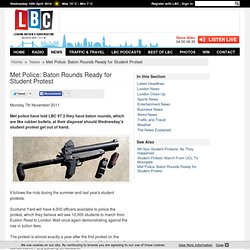
NCAFC statement on police violence threats. The National Campaign Against Fees and Cuts condemns the threats of the Metropolitan Police that rubber bullets may be deployed against student protesters on the November 9th national demonstration The statements, released at a press conference today, were not co-ordinated with us as the organisers of the demonstration – and are part of a deeply cynical attempt to pre-criminalise protest.
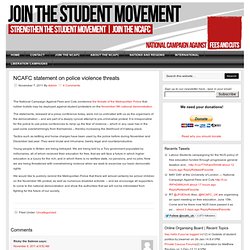
It is irresponsible for the police to use press conferences to ramp up the fear of violence – which in any case has in the past come overwhelmingly from themselves – thereby increasing the likelihood of it taking place. Tactics such as kettling and horse charges have been used by the police before during November and December last year. They were brutal and inhumane, barely legal and counterproductive. Young people in Britain are being betrayed. Plastic bullets available to police for Wednesday's student protests.
Riot police clash with students during the November 2010 demonstrations in London against tuition fees.

Photograph: Kirsty Wigglesworth/AP/Press Association Images Baton rounds of plastic bullets will be available to police chiefs in an attempt to prevent disorder from breaking out in the capital during the latest round of student fees protests. Trained officers will be free to use baton rounds for "extreme" measures as 10,000 protesters march through London on Wednesday to voice their anger over tuition fees and cuts. STUDENT DEMO 9th NOV: THE FACTS. Dan mcquillan: anyone searching the cops... One protester's response to rubber bullets... #nov9.
Paraic O'Brien: chant of choice were I am:... Will there still be Universities after the Revolution? Andrew Wernick The UK Government’s adoption of the Browne Report has all the charm of shock capitalism.
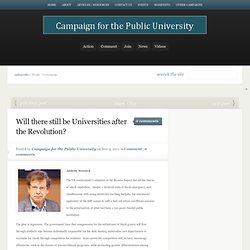
Amidst a declared state of fiscal emergency, and simultaneous with axing university teaching budgets, the ministerial equivalent of the IMF comes in with a bail out whose conditions amount to the privatization of what had been a tax-payer-funded public institution. The plan is ingenious. The government loan that compensates for the withdrawal of block grants will flow through students who become individually responsible for the debt, leaving universities and departments to scramble for funds through competition for students. Inter-university competition will, in turn, encourage efficiencies, such as the closure of low enrollment programs, while promoting greater differentiation among institutions (why should they all do everything?) It would be a mistake, though, to think that mere ideology is in play.
To be sure, state support for university expansion has not been all supply-push. London: Student Protests Against High Tuition Fees. LONDON — Amid a heavy police presence, thousands of students marched through central London on Wednesday to protest cuts to public spending and a big increase in university tuition fees. Police said more than 2,000 people took part in the march, which set off from the University of London at midday with chants of "No ifs, no buts, no education cuts. " Organizers estimated the crowd at 10,000. About 4,000 police officers were deployed along the route. Previous student protests have ended in violence by a minority of demonstrators, including a spontaneous attack on a car carrying Prince Charles and his wife Camilla in December. Initial Statement. How Is The City Built? Email Share 0 Email Share As the City of London prepares to usher in its new Lord Mayor this week, the Occupied Times asks: just how does the City elect its leaders anyway?
The City’s residents get a single vote each; businesses get anywhere up to 79 votes depending on how many employees on payroll. ‘Qualified’ voters – such as ex-company directors and those who’ve worked in the City for five years or more – get to vote twice, once in City elections and again in their home electorate. For comparison, the business vote in 2009 was about 24,000 — compared with just 9000 votes from people who actually live there. Those votes don’t have anything to do with deciding the mayoralty, though. So where do those votes go? Aldermen get a six-year tenure and do not need to live in their ward or even live or work in the Square Mile. So who’s to say the City doesn’t tolerate democratic discourse? By Rory MacKinnon. The medieval, unaccountable Corporation of London is ripe for protest. It's the dark heart of Britain, the place where democracy goes to die, immensely powerful, equally unaccountable. But I doubt that one in 10 British people has any idea of what the Corporation of the City of London is and how it works.
This could be about to change. Occupy London responds to Corporation of London proposal. ANS: Studenten in Londen weer de straat op. Een jaar geleden waren er al rellen in Londen over de verhoging van collegegelden en nog steeds is de rust niet wedergekeerd. Gisteren gingen duizenden studenten de straat op om te protesteren tegen het plan van de overheid om collegegelden te verdrievoudigen en meer marktwerking in het onderwijs te creëren. Ruim vierduizend politieagenten waren op de been, om grootschalige rellen te voorkomen. Als waarschuwing meldde de politie zelfs dat er in het geval van geweld rubberen kogels zouden worden gebruikt. Britse studenten protesteren tegen bezuinigingen.
Duizenden Britse studenten gingen gisteren de straat op in Londen om te demonstreren tegen de bezuinigingen in het onderwijs. Vorig jaar leidden protesten tegen de verhoging van collegegelden tot grote rellen. Om dit te voorkomen rukte de politie gisteren met 4000 man uit. Op 3 - Britse studenten massaal de straten op. Donderdag 10 nov 2011 Protesterende studentenNaomi O'Leary (Reuters) Naast alle Occupy-protesten wereldwijd, zijn Britse studenten woensdag in Londen weer massaal de straat opgegaan om hun kritiek te uiten op het onderwijs. De studenten zijn ontevreden over de hoogte van het collegegeld. De Britse overheid heeft besloten dat universiteiten drie keer zoveel collegegeld mogen vragen als voorheen.
Vorig jaar leidden de protesten tot grote rellen.